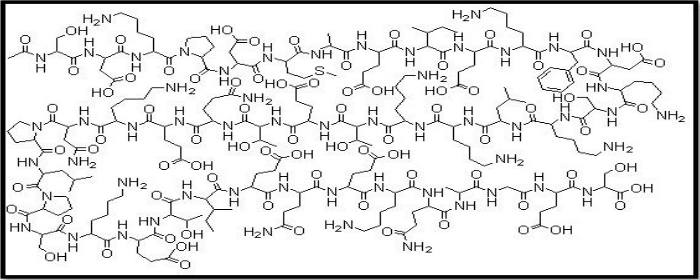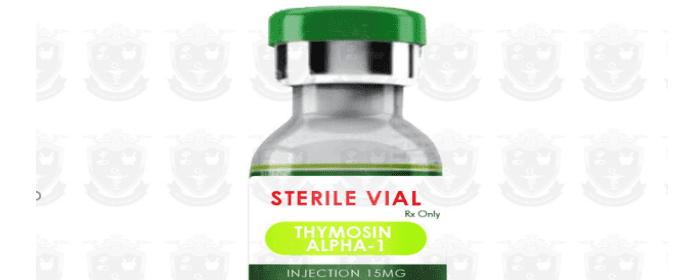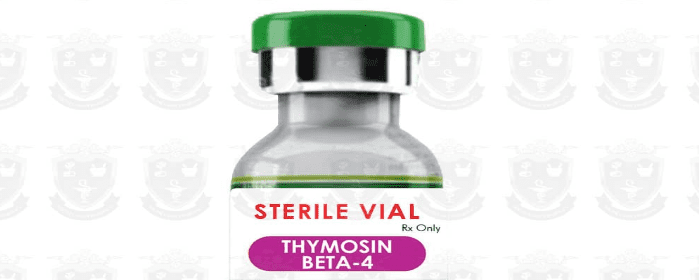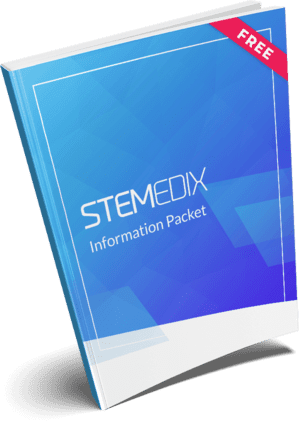
by admin | May 21, 2020 | Peptides
While Thymosin Beta 4 (Thymosin β4) was isolated and characterized nearly 40 years ago, its potential benefits are still being revealed. Thymosin β4 is a peptide that plays a central role in repair, healing, and regeneration. While it was first isolated from the thymus gland (hence, its name), it is found naturally in many tissues of the body. Platelets and white blood cells have particularly high levels of thymosin β4. These facts are biologically important because platelets are the first substances to arrive at the site of injury and white blood cells are the major cells of the immune system.
When the body is injured, platelets, macrophages, and other cells release thymosin β4 at the site of the injury. Thymosin β4 acts at the injury site to stop cell suicide (i.e., apoptosis), reduce overly aggressive inflammation, and slow the growth of infectious microbes. Beyond these actions, however, thymosin β4 also signals stem cells to come to the injury site and differentiate into the cells that are needed for growth, healing, and renewal.
Goldstein and co-authors review the many benefits and potential uses of thymosin β4. In wound healing and repair, thymosin β4 helps new blood vessels and nerves form in injured tissue and, in fact, helps new, healthy tissue to grow. Thymosin β4 reduces the number of myofibroblasts in healing wounds—an action that decreases the formation of scar tissue. The anti-inflammatory actions of thymosin β4 reduce swelling, pain, and tissue damage.
Phase I clinical trials show that thymosin β4 preparations (e.g. eye gel) are safe and well-tolerated. Phase II trials show that thymosin β4 is safe and preliminarily effective in patients with serious pressure ulcers and venous stasis ulcers. Specifically, the wounds appeared to heal faster with treatment in randomized, double-blind, controlled trials. Thymosin β4 has also been used to treat diseases of the eye such as chronic dry eye and diabetic keratopathy. As more clinical trials and pivotal trials are conducted, the clinical applications of this incredible molecule are likely to expand.
If you are interested to learn more on Thymosin Beta 4, please contact your Care Coordinator today at 800-531-0831.
Reference: Goldstein, A., et al. (2012). Thymosin β4: a multi-functional regenerative peptide. Basic properties and clinical applications. Expert Opinion on Biological Therapy. 2012. Volume 12, 2012 – Issue 1.

by admin | May 21, 2020 | Peptides
Thymosin beta-4 (Tb4) is a protein with 43 amino acids. Available by prescription, this water-soluble supplement has regenerative properties which make it a promising therapy for neurodegenerative conditions, including multiple sclerosis (MS). This peptide can also promote wound healing and is a potent anti-inflammatory agent. Discover more about the supplement and its benefits below.
How Tb4 Works
Tb4 is a naturally-occurring peptide which is released by platelets to provide protection at the cellular level against inflammation and other types of damage. It also promotes cell migration, including the differentiation of stem cells. With the help of Tb4, stem cells can form new blood vessels and regenerate tissue.
For individuals with neurodegenerative diseases, Tb4 is particularly beneficial. According to research, Tb4 offers neuroprotection, immunosuppression, and neurorestoration within the central nervous system. In the case of MS, the immune system mistakenly attacks the myelin sheath, which protects and stabilizes the threadlike part of the nerve cell responsible for conducting impulses, known as axons. While conventional MS treatments can control the inflammatory effects of the disease, they fail to regenerate myelin. With its regenerative properties, however, Tb4 could improve functional recovery in the brain, as it has the ability to induce myelin repair.
Benefits of Tb4
While Tb4 may hold the greatest therapeutic potential for people with MS, its long list of benefits could also make it a powerful treatment for other conditions. Here are some of its most noteworthy beneficial effects:
- Repair of heart tissue following cardiovascular events
- Promoted healing of ulcers and lesions
- Neuroprotective properties and restoration following brain injuries
- Quicker wound healing and minimized scar tissue formation; better overall tissue repair
- Improved cell migration to damaged tissue
- Potential hair regrowth
- Improved collagen deposition
- Repair of tendons and ligaments and prevention of fibrous bands/adhesions
- Improved joint flexibility
- Increased strength and endurance
- Muscular improvements, including increased growth and tone and reduced spasms
Tb4 is reported safe and effective when taken in recommended doses. Yet, because it’s a powerful peptide, it requires a prescription and adherence to strict protocols. If you think you could be a good candidate for Tb4, you can learn more or request additional information about the supplement here.

by admin | May 7, 2020 | Peptides
People who are immunocompromised are vulnerable to infectious diseases such as influenza and COVID-19. Their immune systems often lack the ability to detect and fight off infections. One way to try to protect immunocompromised individuals is to give vaccinations. Unfortunately, the immunocompromised state may mean that the vaccine is less effective. Stated another way, the immune system must react to the vaccine to develop immunity to the associated infection. If the immune system is too weak to react to the vaccine, immunocompromised patients remain unprotected even after receiving a vaccine. What is needed is a way to boost the “immunogenicity” of the vaccine.
A promising way to help the immune system is to provide an adjuvant with the vaccine. The adjuvant makes the immune system react more vigorously to the vaccine itself (i.e. increases the immunogenicity of the vaccine). In immunocompromised patients, this adjuvant can mean the difference between a vaccine working and not working. One vaccine adjuvant is thymosin alpha 1, also known as Zadaxin.
Researchers conducted a clinical trial to see if Zadaxin could increase the immunogenicity of the pandemic H1N1v flu vaccine (Focetria) in patients who were immunocompromised. Specifically, they selected patients who were on chronic hemodialysis, which is a treatment for end-stage kidney disease that can interfere with immune system function. They split the patients into three groups: one group got the flu vaccine only, while the other two groups received the flu vaccine plus either low dose or high dose Zadaxin.
The researchers found that adding Zadaxin to the flu vaccine allowed the immune system to generate a much stronger response to the flu vaccine than it did in those who received the vaccine only. More people who received Zadaxin plus flu vaccine developed immunity to influenza than those who received the flu vaccine alone.
The authors admit that larger studies are needed to confirm the finding, but they also note that there were no adverse events (i.e. side effects) caused by Zadaxin during the trial. The treatment was safe, well-tolerated, and did not negatively affect patient laboratory values.
Talk to your Care Coordinator about the peptide option, Thymosin-alpha 1 now offered by Stemedix.
Reference: Carraro, G. (2012). Thymosin-alpha 1 (Zadaxin) Enhances the Immunogenicity of an Adjuvated Pandemic H1N1v Influenza Vaccine (Focetria) in Hemodialyzed Patients: A Pilot Study. Vaccine. 2012 Feb 1;30(6):1170-80.

by admin | Feb 17, 2020 | Peptides
While maintaining proper nutrition is important to powering our bodies and promoting healing, the capabilities of the nutrients we take in through diet can only go so far. To that end, many individuals take supplements on a regular basis. Whether it’s to address a deficiency, help prevent illness, or aid in managing a chronic condition, many physicians understand and support regular supplement use under certain circumstances. Recently, a new supplement has been capturing the attention of experts for its remarkable benefits. Called thymosin beta 4 (TB4), the supplement could play a pivotal role in healing. Find out more about this powerful nutrient below.
What Is TB4?
Thymosin Beta 4 is a regenerative peptide found naturally in the human body. It’s water soluble, which means it won’t get stored in the body when consumed in excess (as is the case with fat-soluble vitamins). The peptide contains amino acids and is a major component found within various types of tissues.
What Are Its Benefits?
Research shows Thymosin Beta 4 has powerful regenerative properties. It’s been linked to blood vessel formation, cellular migration, and stem cell maturation. For this reason, it has been used in clinical trials to promote healing in wounds of the heart, skin, and cornea, among other areas. For instance, when heart muscles have sustained damage as a result of cardiovascular events, TB4 has demonstrated the ability to aid in the formation of new heart muscle cells.
Additionally, the regenerative applications of TB4 have
specifically been studied in neurological applications. The peptide supports
the plasticity and neurovascular remodeling needed for recovery in both the
central and peripheral nervous systems, making it a promising therapy for neurological
injury and neurodegenerative diseases. Researchers have determined that TB4
“significantly improves functional and behavioral outcomes” when administered
24 hours or more following injury or disease onset.
TB4 also has anti-inflammatory properties. It suppresses the
production of pro-inflammatory cytokines while simultaneously exerting
anti-inflammatory effects. For instance, it has been shown to aid
in the dispersion of bacteria-fighting agents following induced bacterial
infections in studies.
Are You a Good Candidate for TB4?
For the most powerful results, TB4 is a prescribed injection
you can administer yourself at home. This allows for the increased production
of T cells, which supports optimal immune system functionality, as well as
Actin regulation, an essential factor for tissue repair.
Thymosin Beta 4 is used for a broad range of applications, including optimizing the healing process following orthopedic-related injuries, as well as managing neurodegenerative conditions such as stroke, multiple sclerosis, and traumatic brain injury. The peptide may also be used for autoimmune diseases, inflammatory conditions such as certain forms of arthritis, Lyme disease, and some infections.
If you’re seeking a therapy option to accelerate healing or help you better manage the symptoms associated with a chronic condition, you could be a good candidate for TB4. In addition to the broad regenerative and anti-inflammatory benefits described above, here are some of the more specific advantages patients notice after incorporating TB4 into their treatment regimen:
- Reduced joint inflammation
- Improved flexibility
- Enhanced tissue repair and muscle development
- Controlled muscle spasms
- Accelerated healing and reduced recovery times
Of course, as with any supplement, it’s essential to seek
professional care when introducing TB4. If you think you could be a good
candidate for TB4 injections, contact Stemedix to learn more.





 St. Petersburg, Florida
St. Petersburg, Florida
